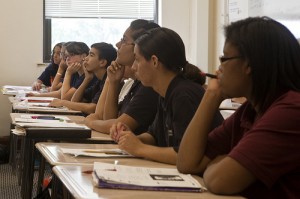Why Latino education is more important than ever
 By Ces’Ari, Being Latino
By Ces’Ari, Being Latino
Educated Latinos are essential to U.S. economic strength. Census data continues to show that black and Latino children make up the majority of babies born in the United States, yet they continually underperform their white peers. However, there is a silver lining to a booming minority population.
Many issues facing these communities are going to be so large that they can no longer be overlooked. Education gaps in particular will have to be addressed if the United States wants to maintain a highly educated workforce.
Interest in minorities’ success derives from the potential economic and social gains the United States can amass. By raising Latino educational attainment levels, the United States will save money on welfare, healthcare and law enforcement, while gaining money through increased tax revenue and higher disposable incomes. The U.S. economy and society will be bettered, while Latinos live higher quality, more civically-engaged, lives – less Latinos will be on welfare, in prison or sick. This is an all-around win-win situation for minorities and the United States.
While the benefits of educating minorities are great, so is the task of getting minority students to perform.
Closing the achievement gap is tedious work. More minority children belong to low-income families compared to their white peers, which has led researchers to believe that opportunity gaps contribute to the achievement gap. If raised in a low-income family, it is more likely that the student will lack necessary education resources at home, which leads poor children to lack academic readiness at the start of their educational journey.
Turning an underperforming school into a community of learners requires a commitment from the private and public sectors, schools, families and communities. Teachers cannot close the achievement gap single-handedly in their classrooms.
Taking time out to volunteer with a classroom or to mentor a student is the first step in closing the achievement gap. Believe me, as a teacher, I would have loved somebody volunteering to grade papers and tests, input data or tutor a student. The extra help would have allowed me to have time to improve my classroom’s learning experience.
I would have loved having any volunteer, but minority high school and college graduates would have been a plus. Students of color need to see successful adults of color to better visualize what they can achieve if they continue their education.
As graduation season quickly approaches, let it serve as a reminder to everyone that education is not over after attaining a diploma. A diploma simply means that it is now time to educate others.
This article first appeared in Being Latino.
Ces’Ari (pronounced Chez-ah-ree) earned a B.A. in Political Science from the University of California, Irvine, and a M.Ed. from Arizona State University, while simultaneously balancing writing and marriage. Read more about Ces’Ari on her personal blog.
[Photo by America Redefined]
